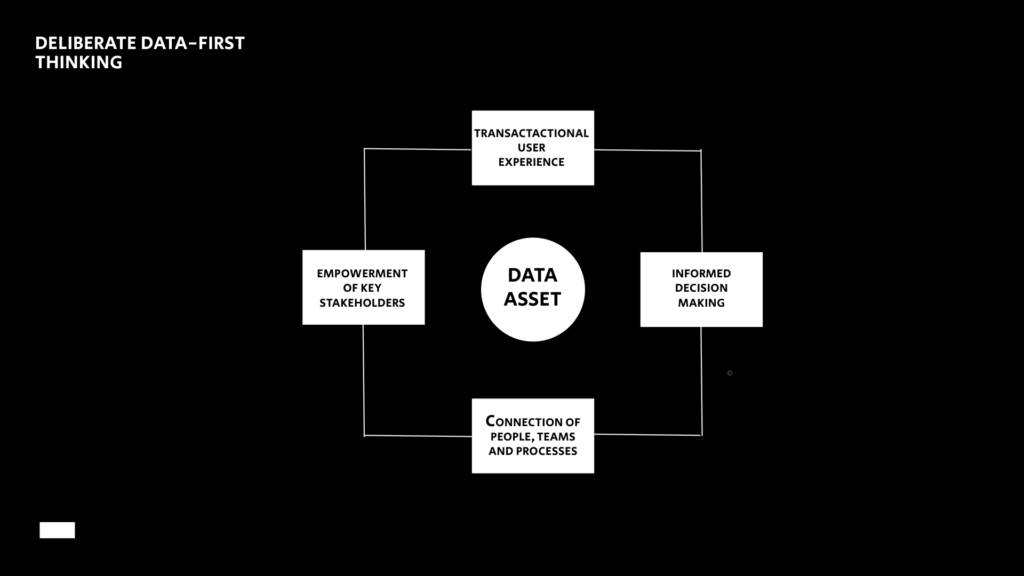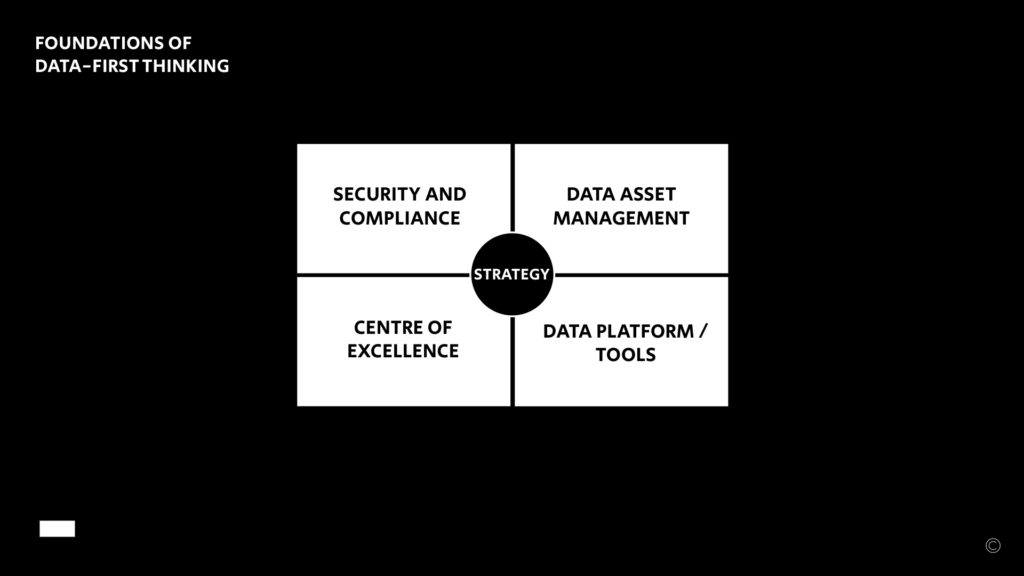
DATA-FIRST THINKING –
No 1 in a series of blogs
on our METHODOLOGY
Professionally, over the last decade I have had the privilege of helping a range of public service organisations approach data and associated technologies in an increasingly strategic and organisationally transformational way. My new colleagues at Pivotl have all been doing the same. Since I joined the company, a lot of our joint reflections about what we have all done, what our customers are saying and how the UK data landscape is shifting, have bought us back to – how best to approach strategic data delivery in these organisations?
We’ve been working with customers to evolve our Data-First methodology. For the organisations we are working with, this is firstly about switching from a passive approach; blindly collecting data through transactions and activity to becoming highly deliberate, in thinking and action, in how they create, obtain, retain and use data. Like all mind-set shifts, Data First thinking isn’t a flick of a cognitive switch, it’s an evolution of individual and collective thought and deed over time.
alignment between data strategy and AI is a prime example of how the two core principles of Deliberate and Foundational Data First thinking remain consistently applicable, especially as technology evolves.
Becoming deliberate with data is a core principle
of Data-First thinking.
Becoming deliberate with data is a core principle of Data-First thinking. If data is viewed as an asset, like those on a balance sheet, then data needs to demonstrably correlate to the value of the organisation, just as any other asset would. Organisational assets are deliberately identified, developed, maintained, secured, used, acquired, sold or even disposed of if they become liabilities. Data (if it’s to be an organisational asset) has to be treated in the same manner.
Being deliberate isn’t all it takes. Data-First is also about evolving a foundational mindset and approach when it comes to data. This has been really exemplified by the fantastic cross sector dialogue evolving around AI and its relation to data.
Practitioners, developers and strategists across the Public Service sector are all highlighting that much of the real value of AI, will only be realised, as the data their organisations hold improves in terms of its quality and availability to AI. Therefore, a successful approach to AI investment needs to be foundationally aligned to the organisation’s investment in data. This means considering and evaluating AI use cases when prioritising investment in data collection, storage, transformation, access, security, skills, and operations.
This recent alignment between data strategy and AI is a prime example of how the two core principles of Deliberate and Foundational Data First thinking remain consistently applicable, especially as technology evolves.
…switching from a passive approach; blindly collecting data through transactions and activity to becoming highly deliberate, in thinking and action, in how they create, obtain, retain and use data.
Framing Data-First in a Methodology
At Pivotl we recognise that we are well equipped to help organisations evolve their data and AI capability through delivery of great products. However, we also believe there is an equal need to be part of facilitating the right strategic thinking and leadership mindset. This isn’t about Pivotl being unquestioned Data and AI experts, we, like everyone in this space, are learning every day.
We do however, want to share our hard-earned know how and experience across a network of partner customers. In return we are learning from our growing network through every interaction. How else would you expect an organisation that values innovation, agile practice and engineering excellence at its core to act?
Helping to evolve the Data-First mindset, Pivotl is aligning our capability, services, products and best practice around the principles of Deliberate and Foundational Data-First thinking.
We are already working with a range of partner customers using a methodology-based approach to identify Deliberate uses of data and data activity to improve the organisations:
- Transactional user experience
- Informed decision making
- Connection of people, teams and processes
- Empowerment of workers, customers and other key stakeholders


This approach helps our customers to move from high-level ambition to specific investment and delivery opportunities. Deliberate data activity aligned to their strategic goals.
To enable the right Foundational thinking and activity to occur in parallel we are aligning our services to four corner stones of Data First design and delivery. These are:
- Data Asset Management
- ‘Baked in’ Security and Compliance
- Developing a Centre of Excellence
- Engineering excellence in Platforms and Tools
Can you help us develop our thinking?
We will be addressing the four Deliberate Data Improvement Outcomes and the four Foundational Cornerstones of our Data First Methodology in two subsequent blogs. Going into more detail of what these are, how they might be approached and what benefits and outcomes they will enable for organisations across the Public Services.
We hope this sharing helps our network and others frame their thinking around Data and AI, but as importantly we want to hear from you to help us evolve this approach so please get in touch below or join the discussion on LinkedIn.





